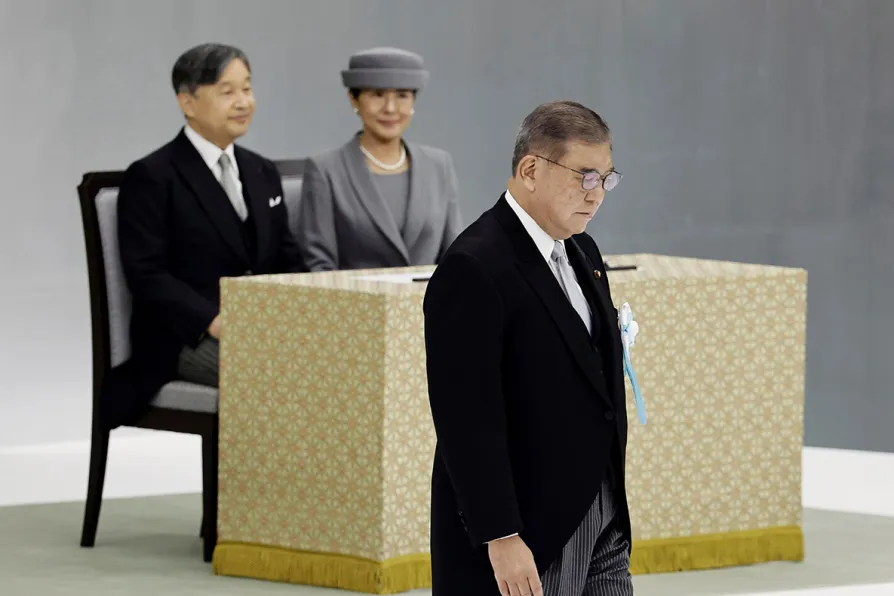
 Japan's Prime Minister Shigeru Ishiba (centre) walks past Japan's Emperor Naruhito and Empress Masako, after delivering a speech at a memorial service marking the 80th anniversary of Japan's World War II defeat, at the Nippon Budokan hall, August 15, 2025
Japan's Prime Minister Shigeru Ishiba (centre) walks past Japan's Emperor Naruhito and Empress Masako, after delivering a speech at a memorial service marking the 80th anniversary of Japan's World War II defeat, at the Nippon Budokan hall, August 15, 2025
SOLEMN ceremonies marking the 80th anniversary of Japan’s surrender in World War II took place across the country today.
Japan commemorates the date on August 15, when then emperor Hirohito announced the end of the war on the radio, though the formal surrender was not signed till September 2.
Prime Minister Shigeru Ishiba struck a different tone from his immediate predecessors, restoring the word “remorse” for Japan’s conduct for the first time since 2013, when it was dropped by nationalist leader Shinzo Abe, himself the grandson of war criminal Nobusuke Kishi.
However, Mr Ishiba kept it vague, pledging: “We will never repeat the tragedy of the war. We will never go the wrong way. Once again, we must keep in our hearts the remorse and lessons.”
Countries invaded or occupied by Japan in the first half of the 20th century, including China and the Korean peninsula, have long complained at Tokyo’s refusal to acknowledge its role as the aggressor in the war or many of the war crimes it committed, including germ warfare, large-scale massacres of civilians — including 300,000 in the “rape of Nanjing” — and gruesome medical experiments conducted on prisoners of war and captive civilians.
Recent nationalist governments have revised school textbooks to downplay these actions, especially as regards the so-called “comfort women,” mainly Korean women who were forced to become sex slaves for Japanese soldiers.
Mr Ishiba did not visit the controversial Yasukuni shrine, which honours Japan’s war dead — including 14 class-A war criminals — but as usual it was a focus of the day for many right-wing politicians, including Agriculture Minister Shinjiro Koizumi.
Postwar Japan was demilitarised and adopted a unique “peace constitution” that bars Tokyo from deploying troops abroad or resolving disputes by force, but successive governments have sought to undermine it.
Japanese Communist Party chairwoman Tamura Tomoko said the party offered condolences to victims of “Japan’s militaristic war of aggression and colonial rule,” acknowledging that it “claimed the lives of more than 20 million people in the Asia-Pacific region and brought brutal damage and suffering, including robbery, assault and sexual violence.”
Chinese Foreign Minister Wang Yi called on Japan to “make the right choice,” recognise the wrongs it had done to its neighbours and uphold peace and the postwar international order.










